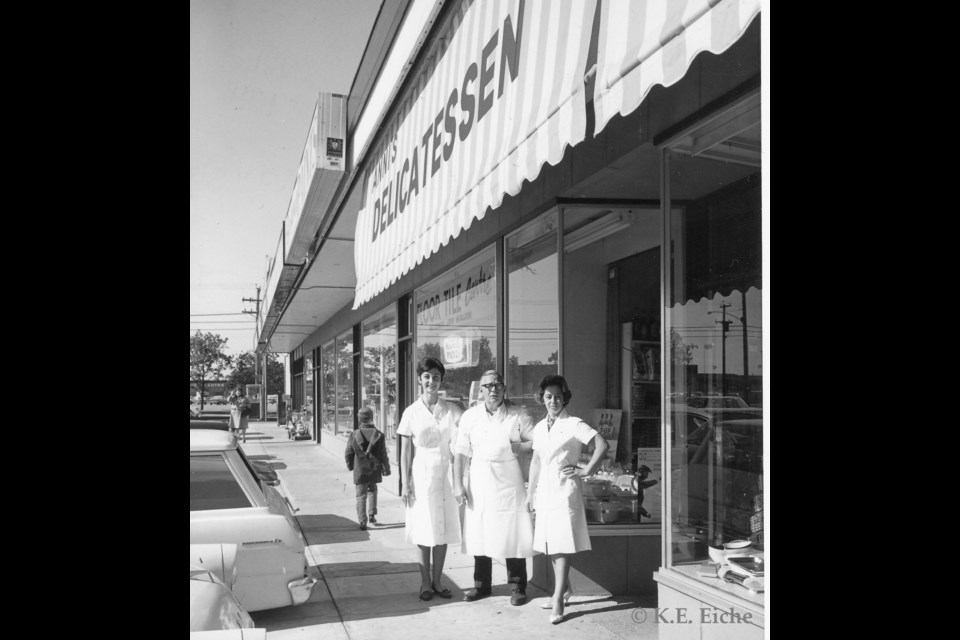Two weeks ago, on Jan. 26, at 4:45 p.m., I went into Coast Capital in Steveston. I’d parked my car on No.1 Road, between Chatham and Moncton, across from the bank. Around 5 p.m., still inside Coast Capital, I heard fire engines arrive. I smelled smoke in the air. Minutes later everyone had evacuated the bank. By then, thick grey and black smoke was billowing from Super Grocer next door. I found my car penned in by fire engines, though there was a small opening at the intersection of Chatham Street and No.1 Road for emergency vehicles to pass through. I asked to be allowed to drive away but a police officer denied my request.
So I sat in my car from 5:15 until 9 p.m., not many meters away from the fire, watching it consume the structure and contents of Super Grocer. During those four hours, my mind wandered through old and long-forgotten memories of grocery and food stores that Richmond and Vancouver had lost – not to fires, but to economic and demographic changes.
There must be many who remember the time when Vancouver’s wonderful department stores also sold food. Eaton’s, Hudson’s Bay and Woodward’s had whole floors dedicated to groceries. The food floors of Hudson’s Bay and Woodward’s were the first to open, in the early 1900s; they lasted well into the second half of the 20th century. Those food floors weren’t like a Safeway or Save-On. They were special, each with its own character. To a child, or anyone blessed with imagination, they opened the door to a magical realm, where wonders from all over the world were brought together under one roof.
A different kind of food store arrived on the scene after the Second World War, when many European immigrants settled in Vancouver and Richmond. They brought their food traditions with them, and before long European delicatessens and bakeries were springing up to serve them. Popular locations for such businesses were on Fraser Street in East Vancouver and Robson Street (long known as Robsonstrasse because of all its German shops) in downtown Vancouver.
Richmond had delicatessens that could compete with those in Vancouver. One of the most popular was Anni’s Delicatessen in the Hyland Park strip mall – on the east side of No. 3 Road, across the street from the shopping centre then called Richmond Square. My mother worked in Anni’s Deli on weekends, as did I. Too young to be properly hired, I helped out in the back room, packing chocolates and candies into bags but also making sausages using the Husqvarna sausage stuffer. Often I’d drive with the owners’ daughter to pick up loaves of bread from the Fraser Bakery on Fraser Street – the car on our return journey filled with the wonderful smell of freshly baked sourdough and rye. Anni’s Deli, like so many of the small European food stores, was more than a place to shop for food items. It was a place where you were bound to meet your friends and catch up on the latest news or gossip.
The food floors in Vancouver’s old department stores are long gone (as are most of the stores themselves). Nearly all of the many European delicatessens and bakeries have also vanished. Still, every now and then a miracle occurs and a new one arrives on the scene – as happened, for instance, in 2012 when D-Original Sausage Haus opened in Steveston.
I can’t be the only one who now regards any surviving family-run business as something to value, to keep alive. Such stores have an important role to play, which goes beyond the purely commercial – they can function as an anchor in the community. And that makes the loss of an old established business like Super Grocer even more devastating. I join everyone who hopes Super Grocer will soon rise from the ashes.
Sabine Eiche is a local writer and art historian with a PhD from Princeton University. She is passionately involved in preserving the environment and protecting nature. Her columns deal with a broad range of topics and often include the history (etymology) of words in order to shed extra light on the subject.





